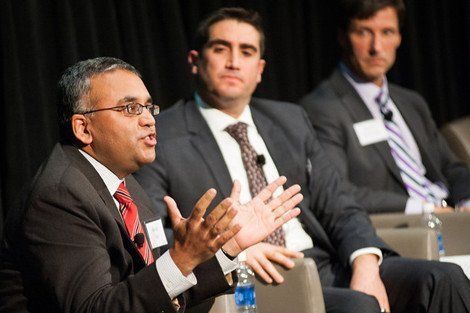December 6, 2013 — A dozen experts discussed health care challenges ranging from delivering humanitarian aid to making surgery safer at a wide-ranging Global Health Summit that drew about 500 to Harvard Medical School’s Joseph B. Martin Conference Center on Monday, November 25, 2013. The Summit—a joint effort of Harvard School of Public Health (HSPH), Brigham and Women’s Hospital (BWH), and Harvard Medical School (HMS)—was aimed at highlighting the three institutions’ collaborations and achievements in the field of global health.
Learning from experience
The first of three panels at the Summit featured HSPH’s [[Michael VanRooyen]] and [[Ashish Jha]] as well as Andrew Ellner, director of HMS’ Program in Global Primary Care and Social Change, discussing what can be learned from global health experiences. VanRooyen, director of the Harvard Humanitarian Initiative, said that humanitarian aid is crucial—whether people are reeling from a natural disaster, from war, or from disease—but that it can be imperfect because aid organizations often don’t coordinate effectively with each other. Given the challenges, it’s important to have a strategic approach when offering humanitarian aid and to move toward “creating humanitarian assistance as its own professional pathway,” he said.
Jha, professor of health policy at HSPH, said he hopes that the U.S. will learn from other countries that have been able to provide good health outcomes in spite of limited resources. Narayana Hospital in Bangalore, India, for example, is able to provide cardiac surgery with outcomes similar to those at U.S. hospitals, but at far less cost. As one of the world’s largest heart hospitals, Jha explained, Narayana is able to achieve significant economies of scale for fixed costs like lab work and pharmacy services. The hospital also shifts low-level tasks like changing dressings to family members and—instead of buying new diagnostic machines when manufacturers stop servicing them—keeps them functioning by hiring independent companies to do repairs.
“As academics, we need to study these things very carefully…to understand in far more detailed ways how people are achieving these great efficiencies, and whether they could work [in the U.S.],” Jha said.
Philanthropic partnerships
The second session featured two global health researchers and two philanthropists who support their efforts. HSPH Dean [[Julio Frenk]], who moderated the panel, spoke of “how philanthropy partnerships help improve the health of people all over the world.”

[[Dyann Wirth]], chair of HSPH’s Department of Immunology and Infectious Diseases and director of the Harvard Malaria Initiative, said that to solve a global health problem such as malaria you need people like me to figure out how to develop therapies or interventions, but you also need people to figure out how to deliver interventions, how to impact policy.” She noted that the distribution of bed nets in Africa—a key strategy to stop the spread of malaria—has been driven by the efforts of fellow panelist and philanthropist J. Christopher Flowers, chairman and CEO of J.C. Flowers & Co., a financial services investment company.
The J.C. Flowers Foundation has been distributing bed nets in 17 African countries over the past ten years. “It’s my hope that the day will come where scientists come up with vaccines and treatments that make this [the distribution of bed nets] all useless,” Flowers said. “But in the meantime, I think we’re helping.”
Alleviating suffering
The Summit’s third panel focused on efforts to curb human suffering. Speakers included HSPH’s [[Atul Gawande]], who has done pioneering work on improving health care by using simple checklists; [[Paul Farmer]], co-founder and chief strategist of Partners in Health, which partners with organizations in resource-poor countries to improve health; and Nawal Nour, director of Global Obstetrics and Gynecologic Health for BWH, director of the hospital’s African Women’s Health Practice, and an expert on female genital cutting.

Gawande, director of Ariadne Labs, a joint center for health systems innovation at BWH and HSPH, said his work developing checklists—for safe surgery, for better maternal care, and for better end-of-life care—stems from his desire to understand “why change is so hard and confusing and conflicting….Most of what I write about are problems I don’t understand, and want to know how to solve. I try to use research, writing, whatever, to work through puzzles.” Gawande said he has learned that “there’s no mistake that’s too dumb we can make.” He added, “We focus on the front end—invent the drug, invent the device, pass the law—and we think very little about how to make the front end actually work.”
Farmer recalled how, while a student at Duke University, he wrote for a student publication about the difficult conditions faced by Haitian migrant farm workers in North Carolina—and how it led him, eventually, to devote years of effort to improving health care in Haiti.
“Anybody can be a global health worker, and everybody should be a global health worker,” Farmer said. “This is the standard by which we’ll judge our societies: how well we take care of the poor.”
photos: Emily Cuccarese
Watch webcasts of the three panel discussions:
“The Global Health Experience: What We Can Learn”
“To Alleviate Human Suffering: Our Work to Strengthen Global Healthcare”
